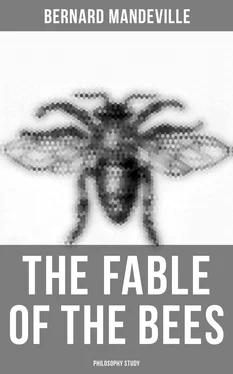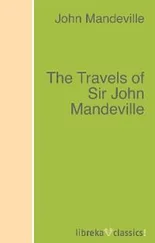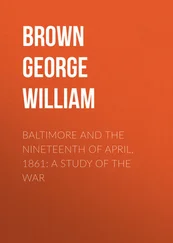I shall spend no time in answering these accusations: where men are prejudiced, the best apologies are lost; and I know that those who think it criminal to suppose a necessity of vice in any case whatever, will never be reconciled to any part of the performance; but if this be thoroughly examined, all the offence it can give must result from the wrong inferences that may perhaps be drawn from it, and which I desire nobody to make. When I assert that vices are inseparable from great and potent societies, and that it is impossible their wealth and grandeur should subsist without, I do not say that the particular members of them who are guilty of any should not be continually reproved, or not be punished for them when they grow into crimes.
There are, I believe, few people in London, of those that are at any time forced to go a-foot, but what could wish the streets of it much cleaner than generally they are; while they regard nothing but their own clothes and private conveniency; but when once they come to consider, that what offends them, is the result of the plenty, great traffic, and opulency of that mighty city, if they have any concern in its welfare, they will hardly ever wish to see the streets of it less dirty. For if we mind the materials of all sorts that must supply such an infinite number of trades and handicrafts, as are always going forward; the vast quantity of victuals, drink, and fuel, that are daily consumed in it; the waste and superfluities that must be produced from them; the multitudes of horses, and other cattle, that are always dawbing the streets; the carts, coaches, and more heavy carriages that are perpetually wearing and breaking the pavement of them; and, above all, the numberless swarms of people that are continually harassing and trampling through every part of them: If, I say, we mind all these, we shall find, that every moment must produce new filth; and, considering how far distant the great streets are from the river side, what cost and care soever be bestowed to remove the nastiness almost as fast as it is made, it is impossible London should be more cleanly before it is less flourishing. Now would I ask, if a good citizen, in consideration of what has been said, might not assert, that dirty streets are a necessary evil, inseparable from the felicity of London, without being the least hinderance to the cleaning of shoes, or sweeping of streets, and consequently without any prejudice either to the blackguard or the scavingers.
But if, without any regard to the interest or happiness of the city, the question was put, What place I thought most pleasant to walk in? Nobody can doubt, but before the stinking streets of London, I would esteem a fragrant garden, or a shady grove in the country. In the same manner, if laying aside all worldly greatness and vain glory, I should be asked where I thought it was most probable that men might enjoy true happiness, I would prefer a small peaceable society, in which men, neither envied nor esteemed by neighbours, should be contented to live upon the natural product of the spot they inhabit, to a vast multitude abounding in wealth and power, that should always be conquering others by their arms abroad, and debauching themselves by foreign luxury at home.
Thus much I had said to the reader in the first edition; and have added nothing by way of preface in the second. But since that, a violent outcry has been made against the book, exactly answering the expectation I always had of the justice, the wisdom, the charity, and fair-dealing of those whose good will I despaired of. It has been presented by the Grand Jury, and condemned by thousands who never saw a word of it. It has been preached against before my Lord Mayor; and an utter refutation of it is daily expected from a reverend divine, who has called me names in the advertisements, and threatened to answer me in two months time for above five months together. What I have to say for myself, the reader will see in my Vindication at the end of the book, where he will likewise find the Grand Jury’s Presentment, and a letter to the Right Honourable Lord C. which is very rhetorical beyond argument or connection. The author shows a fine talent for invectives, and great sagacity in discovering atheism, where others can find none. He is zealous against wicked books, points at the Fable of the Bees, and is very angry with the author: He bestows four strong epithets on the enormity of his guilt, and by several elegant innuendos to the multitude, as the danger there is in suffering such authors to live, and the vengeance of Heaven upon a whole nation, very charitably recommends him to their care.
Considering the length of this epistle, and that it is not wholly levelled at me only, I thought at first to have made some extracts from it of what related to myself; but finding, on a nearer inquiry, that what concerned me was so blended and interwoven with what did not, I was obliged to trouble the reader with it entire, not without hopes that, prolix as it is, the extravagancy of it will be entertaining to those who have perused the treatise it condemns with so much horror.
1This was wrote in 1714.
THE
GRUMBLING HIVE:
OR,
KNAVES TURN’D HONEST.
Table of Contents
A spacious hive well stock’d with bees,
That liv’d in luxury and ease;
And yet as fam’d for laws and arms,
As yielding large and early swarms;
Was counted the great nursery 5
Of sciences and industry.
No bees had better government,
More fickleness, or less content:
They were not slaves to tyranny.
Nor rul’d by wild democracy; 10
But kings, that could not wrong, because
Their power was circumscrib’d by laws.
These insects liv’d like men, and all
Our actions they performed in small:
They did whatever’s done in town, 15
And what belongs to sword or gown:
Though th’ artful works, by nimble slight
Of minute limbs, ’scap’d human sight;
Yet we’ve no engines, labourers,
Ships, castles, arms, artificers, 20
Craft, science, shop, or instrument,
But they had an equivalent:
Which, since their language is unknown,
Must be call’d, as we do our own.
As grant, that among other things, 25
They wanted dice, yet they had kings;
And those had guards; from whence we may
Justly conclude, they had some play;
Unless a regiment be shown
Of soldiers, that make use of none. 30
Vast numbers throng’d the fruitful hive;
Yet those vast numbers made ’em thrive;
Millions endeavouring to supply
Each other’s lust and vanity;
While other millions were employ’d, 35
To see their handy-works destroy’d;
They furnish’d half the universe;
Yet had more work than labourers.
Some with vast flocks, and little pains,
Jump’d into business of great gains; 40
And some were damn’d to scythes and spades,
And all those hard laborious trades;
Where willing wretches daily sweat,
And wear out strength and limbs to eat:
While others follow’d mysteries, 45
To which few folks binds ’prentices;
That want no stock, but that of brass,
And may set up without a cross;
As sharpers, parasites, pimps, players,
Pickpockets, coiners, quacks, soothsayers, 50
And all those, that in enmity,
With downright working, cunningly
Convert to their own use the labour
Of their good-natur’d heedless neighbour.
These were call’d Knaves, but bar the name, 55
The grave industrious were the same:
All trades and places knew some cheat,
No calling was without deceit.
The lawyers, of whose art the basis
Was raising feuds and splitting cases, 60
Oppos’d all registers, that cheats
Might make more work with dipt estates;
Читать дальше












